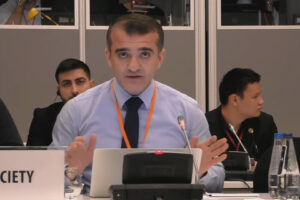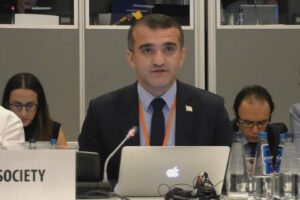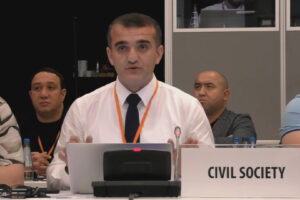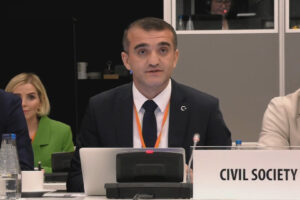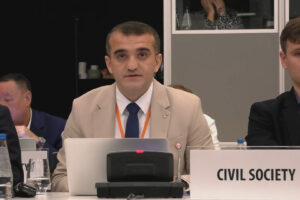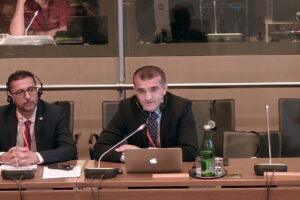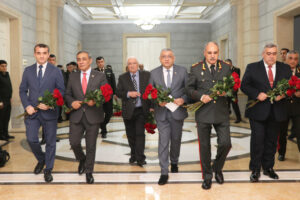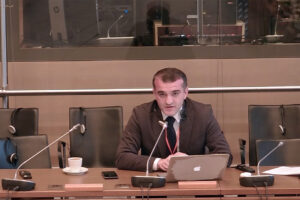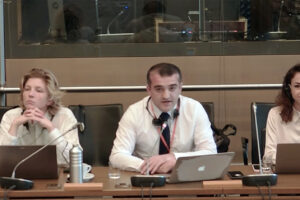IBAHRI Calls on Azerbaijan Court Not to Disbar Defense Lawyer Khalid Bagirov

The International Bar Association’s Human Rights Institute (IBAHRI) calls on Azerbaijan’s Nizami District Court not to disbar criminal defense lawyer Khalid Bagirov, and to ensure that the hearing, scheduled for 2 February 2015, respects his right to a fair trial as enshrined in Article 6 of the European Convention of Human Rights, to which Azerbaijan is party.
The Presidium of the Azerbaijan Bar Association has asked the Court to disbar Mr Bagriov, following disciplinary proceedings. This demand comes amid a recent crackdown on journalists, civil society and human rights defenders in Azerbaijan.
A prominent defense lawyer, Mr Bagirov represented opposition leader Ilgar Mammadov, who is currently serving a seven-year prison sentence for organizing mass disturbances and resisting the police, despite the European Court of Human Right’s decision that Azerbaijan had violated a number of basic human rights provisions in arresting and sentencing him.
IBAHRI Co-Chair Hans Corell said: ‘The International Bar Association’s Human Rights Institute is deeply concerned by the Azerbaijan Bar Association’s application to the Nizami Court to suspend Khalid Bagirov’s license. As a defense lawyer of a number of high-profile political opposition clients, the potential disbarment of Mr Bagirov appears to be in line with the Azerbaijan authorities’ attempts to suppress critical voices, and stamp out any form of dissent. In short, to silence civil society.’
He added: ‘As documented in the IBAHRI’s fact-finding report Azerbaijan: Freedom of Expression on Trial, Azerbaijan’s Bar Association is not an independent institution capable of protecting the interests of the legal profession in Azerbaijan. Instead, it seems to act as an arm of government, frequently subjecting members involved in politically motivated trials to biased disciplinary proceedings resulting in disbarment. The IBAHRI calls on Azerbaijan’s judiciary to adhere to the principles laid down in the United Nations Basic Principles on the Role of Lawyers, which states that “Lawyers shall not be identified with their clients or their clients’ causes as a result of discharging their functions.”’
According to IBAHRI, at a time when Azerbaijan’s tenure of the Chairmanship of the Committee of Ministers of the Council of Europe has not long concluded, the country is experiencing a significant deterioration in its human rights record. In recent months, lawyers representing imprisoned human rights defenders have been called as witnesses in their own clients’ cases, in what appears to be a strategy designed to frustrate their ability to represent their clients and also an indication that the government is casting its net wider by targeting human rights lawyers.
Recall that Khalid Bagirov was removed from the protection of the leader of REAL Ilgar Mamedov, human rights activist Leyla Yunus and her husband Arif, blogger Abdul Abilov, activists of NIDA, the activist Omar Mamedov and others.
In August 2014 the International Bar Association, Amnesty International, Human Rights Watch and other international organizations issued a joint letter to Secretary General of the Council of Europe, Strasbourg urging to take steps to stop the repression in Azerbaijan
* The International Bar Association (IBA), established in 1947, is the world’s leading organization of international legal practitioners, bar associations and law societies. Through its global membership of individual lawyers, law firms, bar associations and law societies it influences the development of international law reform and shapes the future of the legal profession throughout the world.
The IBA’s administrative office is in London. Regional offices are located in: São Paulo, Brazil; Seoul, South Korea; and Washington DC, US, while the International Bar Association’s International Criminal Court Programme (IBA ICC) is managed from an office in The Hague.
The International Bar Association’s Human Rights Institute (IBAHRI) works to promote, protect and enforce human rights under a just rule of law, and to preserve the independence of the judiciary and the legal profession worldwide.
IBAHRI Calls on Azerbaijan Court Not to Disbar Defense Lawyer Khalid Bagirov
 02 February 2015
02 February 2015
The International Bar Association’s Human Rights Institute (IBAHRI) calls on Azerbaijan’s Nizami District Court not to disbar criminal defense lawyer Khalid Bagirov, and to ensure that the hearing, scheduled for 2 February 2015, respects his right to a fair trial as enshrined in Article 6 of the European Convention of Human Rights, to which Azerbaijan is party.
The Presidium of the Azerbaijan Bar Association has asked the Court to disbar Mr Bagriov, following disciplinary proceedings. This demand comes amid a recent crackdown on journalists, civil society and human rights defenders in Azerbaijan.
A prominent defense lawyer, Mr Bagirov represented opposition leader Ilgar Mammadov, who is currently serving a seven-year prison sentence for organizing mass disturbances and resisting the police, despite the European Court of Human Right’s decision that Azerbaijan had violated a number of basic human rights provisions in arresting and sentencing him.
IBAHRI Co-Chair Hans Corell said: ‘The International Bar Association’s Human Rights Institute is deeply concerned by the Azerbaijan Bar Association’s application to the Nizami Court to suspend Khalid Bagirov’s license. As a defense lawyer of a number of high-profile political opposition clients, the potential disbarment of Mr Bagirov appears to be in line with the Azerbaijan authorities’ attempts to suppress critical voices, and stamp out any form of dissent. In short, to silence civil society.’
He added: ‘As documented in the IBAHRI’s fact-finding report Azerbaijan: Freedom of Expression on Trial, Azerbaijan’s Bar Association is not an independent institution capable of protecting the interests of the legal profession in Azerbaijan. Instead, it seems to act as an arm of government, frequently subjecting members involved in politically motivated trials to biased disciplinary proceedings resulting in disbarment. The IBAHRI calls on Azerbaijan’s judiciary to adhere to the principles laid down in the United Nations Basic Principles on the Role of Lawyers, which states that “Lawyers shall not be identified with their clients or their clients’ causes as a result of discharging their functions.”’
According to IBAHRI, at a time when Azerbaijan’s tenure of the Chairmanship of the Committee of Ministers of the Council of Europe has not long concluded, the country is experiencing a significant deterioration in its human rights record. In recent months, lawyers representing imprisoned human rights defenders have been called as witnesses in their own clients’ cases, in what appears to be a strategy designed to frustrate their ability to represent their clients and also an indication that the government is casting its net wider by targeting human rights lawyers.
Recall that Khalid Bagirov was removed from the protection of the leader of REAL Ilgar Mamedov, human rights activist Leyla Yunus and her husband Arif, blogger Abdul Abilov, activists of NIDA, the activist Omar Mamedov and others.
In August 2014 the International Bar Association, Amnesty International, Human Rights Watch and other international organizations issued a joint letter to Secretary General of the Council of Europe, Strasbourg urging to take steps to stop the repression in Azerbaijan
* The International Bar Association (IBA), established in 1947, is the world’s leading organization of international legal practitioners, bar associations and law societies. Through its global membership of individual lawyers, law firms, bar associations and law societies it influences the development of international law reform and shapes the future of the legal profession throughout the world.
The IBA’s administrative office is in London. Regional offices are located in: São Paulo, Brazil; Seoul, South Korea; and Washington DC, US, while the International Bar Association’s International Criminal Court Programme (IBA ICC) is managed from an office in The Hague.
The International Bar Association’s Human Rights Institute (IBAHRI) works to promote, protect and enforce human rights under a just rule of law, and to preserve the independence of the judiciary and the legal profession worldwide.
 @
@










